The use of birch tar from aphids
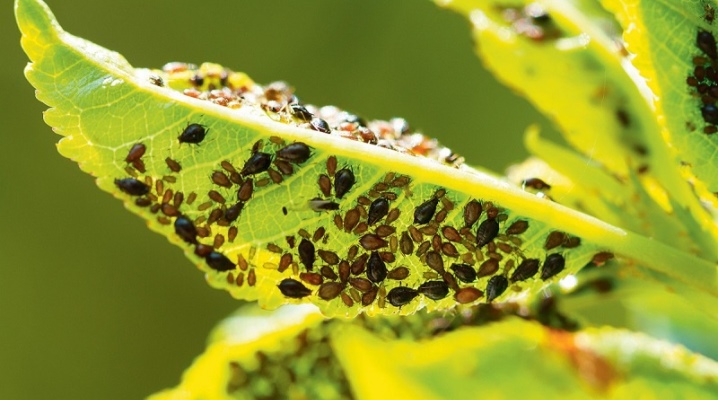
On garden plots and vegetable gardens throughout the season, it is necessary to carry out preventive measures so that various pests do not attack the plants and do not destroy them. One of the most common pests is aphid, which affects trees, shrubs, flowers, and vegetables. There are many products available in stores. But those who do not want to use harmful chemicals should consider using birch tar for aphids.
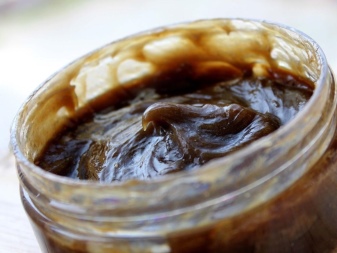
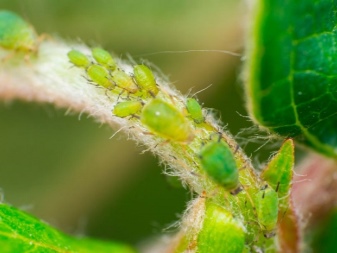
Features of use
Many summer residents use birch tar from aphids when it is not possible to use chemical compounds that act quite aggressively, although effectively. There are situations when an aphid invasion happened just at the moment when the trees already have fruits, vegetables are in the ripening stage, flowers have blossomed. At such moments, you need to act carefully so as not to ruin the crop and not to supply it with substances harmful to humans. It is also impossible to leave the plant until the moment when the crop is harvested, since it may simply die. Aphids spread rather quickly and can not only spoil the appearance of the plant, but also completely destroy it.
Then birch tar comes to the rescue. It can be obtained in a special way by heating birch bark in a closed container using a certain technology. But this method is quite laborious, in addition, you also need to get birch bark somewhere, without harming nature. At home, it is too troublesome to extract tar in this way. Therefore, the easiest way is to purchase a ready-made solution in bottles and dilute it in the required proportions. You can buy the solution at any pharmacy.
Sometimes summer residents prepare a solution of tar soap, which also has a positive effect. To do this, the soap can simply be grated and soaked in water for several hours.
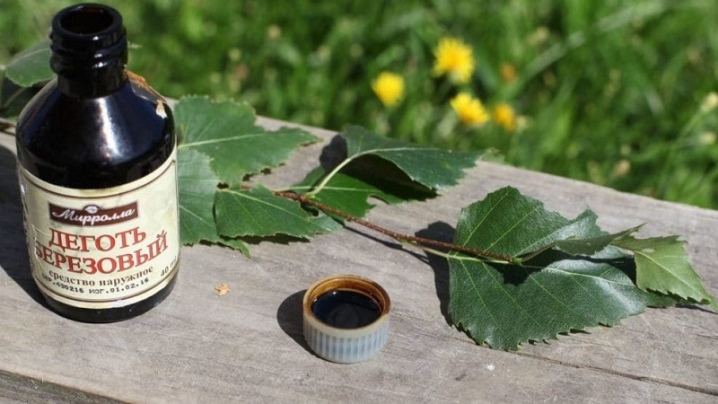
How to dilute?
The spray recipe is very simple. You need to take 10 liters of water and add 10-15 g of birch tar to it. The liquid itself is an oily substance with a pungent odor.... After stirring the right amount of tar in the water, you can start the spraying or watering procedure. For greater efficiency, finely planed laundry soap is added to it.
Another option is to dissolve tar in water, add ash there, mix everything well. Plants can be sprayed and watered with this solution. All these options will not bring any harm to plants, but they will get rid of aphids. With the same solutions, you can soak bandages and tie the trunks of trees, as well as add them to mulch, which will serve as an excellent prevention against aphids.
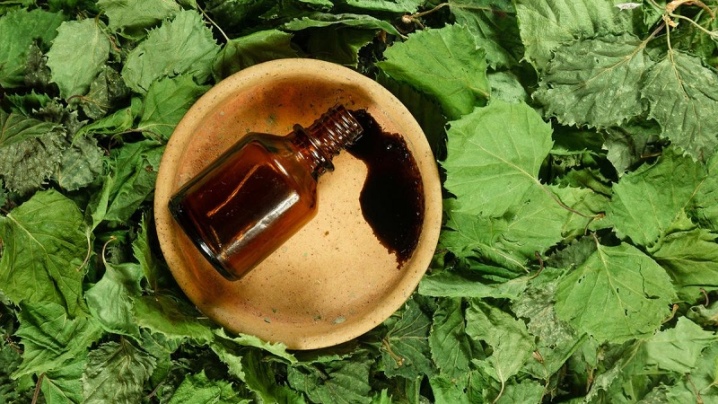
How to apply?
The use of birch tar helps in the fight against aphids in different crops:
- on fruit trees (peach, apricot, cherry, apple, pear);
- berry bushes (currants, raspberries, blackberries, honeysuckle);
- on vegetables (cabbage, tomatoes, cucumbers and others);
- on flowers, including roses.
The instructions for use are very simple, with the help of such a tool it is difficult to harm the plant. Let's consider in more detail how to use aphid remedy on roses. These beautiful plantings are very often infested with aphids. It is very easy to recognize her arrival. Fresh leaves curl and then dry up, the buds also cannot gain strength, they wither, and never fully open. If you do not start eliminating pests in time, the plant will simply die.
- Before starting treatment, already dried leaves and buds will have to be cut and removed away from the plants, then burned.
- The solution must be poured into a spray bottle, which can give a powerful stream.
- Aphids live on fresh leaves, stems and flowers. It is necessary with the help of a solution to very carefully process each leaf, while paying special attention to its inner part, since the aphid settles there.
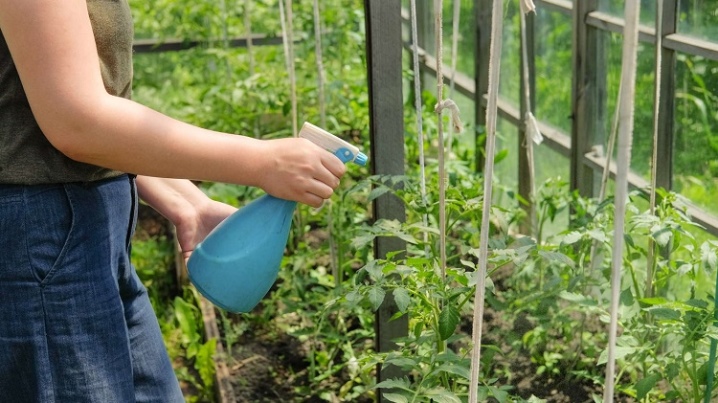
It is necessary to process the plant in dry, calm weather, in the evening, when there is no longer a hot sun. After 2 weeks after treatment, the procedure should be repeated. It is better to use this method for prevention purposes. To do this, it is enough to use this solution once a month. On average, a rose bush with a height of about 1.5 m, with careful processing, will take about a liter of solution. The jet should be strong enough to knock the aphids off their leaves and stems to the ground where they are not viable. It feeds on plant juices.
Young seedlings of trees and shrubs are also susceptible to this pest. The processing method is exactly the same. You will have to carefully process each tree, not missing a single site. But if you take into account that the trees may already be mature and tall, it will be extremely difficult to process them, you will need a ladder, and it will still be problematic to pay attention to each leaf. Therefore, with such plantings, it is better to use birch tar as a prophylactic agent.
To do this, you need to take a wide bandage in several layers or a wide strip of dense fabric, soak the material well with a solution of tar. Then tightly wrap the tree trunk with a cloth impregnated with the composition.
Aphids for these trees will not be scary throughout the season. This is evidenced by the reviews of summer residents.
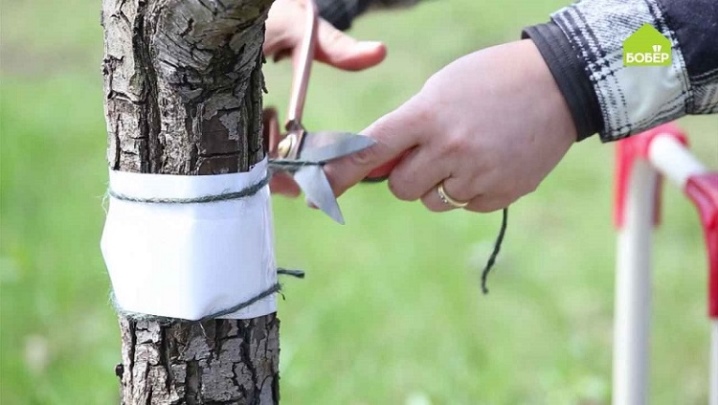
Another very effective preventive measure is soil mulching with birch tar. To do this, take sawdust, spray them well with tar, then pour boiling water over them. The sawdust will swell slightly, absorbing moisture. After that, the sawdust can be laid out:
- in tree trunks;
- under shrubs;
- between vegetable beds;
- in the flower beds.
In this case, the sawdust must be well distributed between the plants so that they cover the soil with a dense layer. This will save not only from aphids, but also from weeds. It is best not to wait for the arrival of aphids, but to use various preventive options using birch tar. It is both simpler and the effect will be much more lasting. Both tying trees and mulch with tar allow you to forget about aphids for the whole summer. Treatment of diseased plants should be thorough, it will take a lot of time, and it will have to be repeated several times per season. It all depends on the degree of damage to the plants.
In addition, it is worth considering that these procedures are very effective not only in the fight against aphids. Other pests of the garden and vegetable garden will also bypass such trees, shrubs and vegetable plantings. These include, for example, ants, various beetles, which also cause a lot of harm to plants.
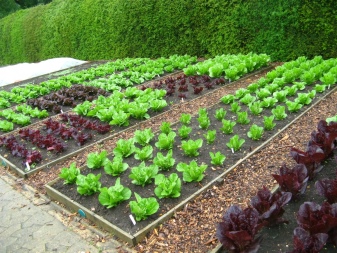
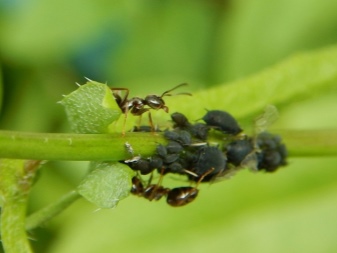
In the next video, you will find additional information on the use of birch tar for aphids.










The comment was sent successfully.